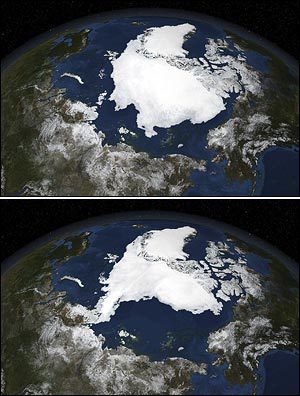Scientists from the University of Colorado at Boulder's National Snow and Ice Data Center said today that the extent of Arctic sea ice appears to have reached its minimum for 2007 on Sept. 16, shattering all previous lows since satellite record-keeping began nearly 30 years ago.
The Arctic sea ice extent on Sept. 16 stood at 1.59 million square miles, or 4.13 million square kilometers, as calculated using a five-day running average, according to the team. Compared to the long-term minimum average from 1979 to 2000, the new minimum extent was lower by about 1 million square miles -- an area about the size of Alaska and Texas combined, or 10 United Kingdoms, they reported.

|
| ©telegraph.co.uk
|
| Photographs taken in September 2005 and 2007
|
The minimum also breaks the previous minimum set on Sept. 20 and Sept. 21 of 2005 by about 460,000 square miles, an area roughly the size of Texas and California combined, or five United Kingdoms, they found. The sea ice extent is the total area of all Arctic regions where ice covers at least 15 percent of the ocean surface.


